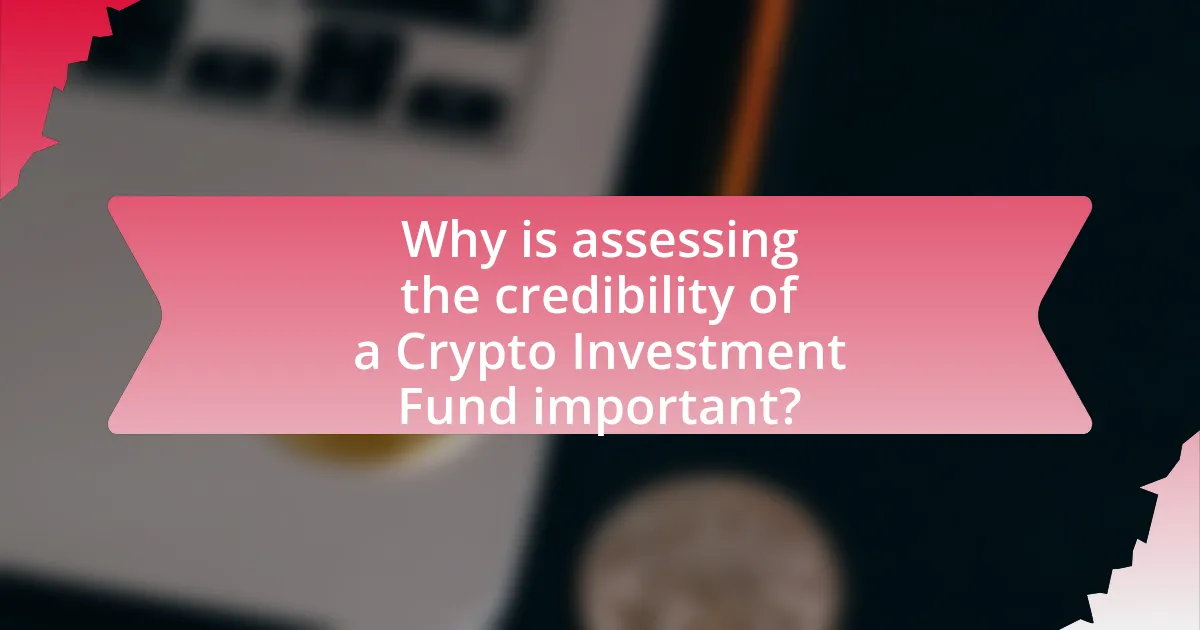A Crypto Investment Fund is a pooled investment vehicle that focuses on cryptocurrencies and blockchain-related assets, aiming to generate returns through various strategies. The article outlines how these funds operate, the key components that influence their performance, and the different types of crypto investment funds available, such as hedge funds and venture capital funds. It emphasizes the importance of assessing fund credibility through indicators like regulatory compliance, transparency, and management expertise, while also discussing the risks associated with investing in these funds. Additionally, best practices for evaluating funds and common pitfalls to avoid are highlighted, providing investors with essential insights for informed decision-making in the cryptocurrency market.

What is a Crypto Investment Fund?
A Crypto Investment Fund is a pooled investment vehicle that focuses on investing in cryptocurrencies and blockchain-related assets. These funds typically gather capital from multiple investors to create a diversified portfolio of digital assets, aiming to generate returns through various strategies such as trading, holding, or staking cryptocurrencies. According to a report by PwC, the number of crypto hedge funds has increased significantly, indicating growing interest and participation in this investment sector.
How do Crypto Investment Funds operate?
Crypto investment funds operate by pooling capital from multiple investors to invest in various cryptocurrencies and blockchain-related assets. These funds typically employ professional fund managers who analyze market trends, select investment opportunities, and manage the portfolio to maximize returns. According to a report by PwC, the crypto fund industry has seen significant growth, with over 800 crypto hedge funds operating globally as of 2021, indicating a robust interest and participation in this investment vehicle.
What are the key components of a Crypto Investment Fund?
The key components of a Crypto Investment Fund include a well-defined investment strategy, a robust risk management framework, regulatory compliance, transparent reporting practices, and a skilled management team. A well-defined investment strategy outlines the fund’s approach to asset selection, whether it focuses on long-term holdings, trading strategies, or a mix of both. A robust risk management framework is essential to mitigate potential losses, often employing tools like diversification and stop-loss orders. Regulatory compliance ensures that the fund adheres to legal standards, which is crucial for credibility and investor protection. Transparent reporting practices provide investors with clear insights into fund performance and holdings, fostering trust. Lastly, a skilled management team with experience in cryptocurrency markets is vital for making informed investment decisions and navigating market volatility. These components collectively contribute to the fund’s overall credibility and effectiveness in managing investments.
How do these components influence fund performance?
The components of a crypto investment fund, such as management expertise, investment strategy, and risk management practices, significantly influence fund performance. Management expertise affects decision-making and the ability to navigate market volatility; for instance, funds led by experienced managers often outperform those with less experienced leadership. Investment strategy determines asset allocation and diversification, which can mitigate risks and enhance returns; funds employing a well-researched strategy have historically shown better performance metrics. Risk management practices, including the use of stop-loss orders and portfolio rebalancing, help protect against significant losses, thereby stabilizing returns over time. Studies have shown that funds with robust risk management frameworks tend to achieve higher risk-adjusted returns, validating the importance of these components in influencing overall fund performance.
What types of Crypto Investment Funds exist?
There are several types of crypto investment funds, including hedge funds, venture capital funds, index funds, and exchange-traded funds (ETFs). Hedge funds typically employ various strategies to generate high returns, often investing in a diverse range of cryptocurrencies and blockchain projects. Venture capital funds focus on investing in early-stage blockchain startups, providing capital in exchange for equity. Index funds aim to replicate the performance of a specific cryptocurrency index, allowing investors to gain exposure to a broad market segment. ETFs are investment funds that are traded on stock exchanges and track the price of a specific cryptocurrency or a basket of cryptocurrencies. Each type of fund serves different investment strategies and risk profiles, catering to a variety of investor needs in the cryptocurrency market.
What distinguishes hedge funds from venture capital funds in crypto?
Hedge funds and venture capital funds in crypto differ primarily in their investment strategies and risk profiles. Hedge funds typically engage in a wide range of investment strategies, including long and short positions, derivatives trading, and leverage, aiming for high returns in both bullish and bearish markets. In contrast, venture capital funds focus on investing in early-stage crypto startups, providing capital in exchange for equity, and generally seek long-term growth rather than short-term gains.
The distinction is further highlighted by their liquidity profiles; hedge funds often allow for more frequent withdrawals, while venture capital investments are usually locked in for several years until the startup matures or is acquired. According to a report by Preqin, hedge funds have a more diverse portfolio approach, whereas venture capital funds concentrate on a limited number of high-potential projects, reflecting their differing investment philosophies and timelines.
How do index funds differ from actively managed funds in the crypto space?
Index funds in the crypto space differ from actively managed funds primarily in their investment strategy and management style. Index funds aim to replicate the performance of a specific cryptocurrency index by holding a diversified portfolio of cryptocurrencies that reflect that index, typically with lower fees and minimal trading activity. In contrast, actively managed funds involve a team of managers making investment decisions based on market analysis, aiming to outperform the market through selective buying and selling of cryptocurrencies, which often results in higher fees and more frequent trading. For example, a study by Bitwise Asset Management in 2020 indicated that over 90% of actively managed crypto funds underperformed their benchmark indices, highlighting the challenges of active management in this volatile market.

Why is assessing the credibility of a Crypto Investment Fund important?
Assessing the credibility of a Crypto Investment Fund is crucial to mitigate risks associated with fraud and mismanagement. Credible funds typically have transparent operations, regulatory compliance, and a proven track record, which can significantly reduce the likelihood of financial loss for investors. For instance, according to a report by the Financial Action Task Force, approximately 95% of cryptocurrency scams are linked to unregulated funds, highlighting the importance of due diligence in evaluating fund credibility.
What risks are associated with investing in Crypto Investment Funds?
Investing in Crypto Investment Funds carries several risks, including market volatility, regulatory uncertainty, and potential fraud. Market volatility is significant, as cryptocurrencies can experience rapid price fluctuations, leading to substantial losses. Regulatory uncertainty arises from the evolving legal landscape surrounding cryptocurrencies, which can impact fund operations and investor protections. Additionally, the risk of fraud is prevalent, as some funds may lack transparency or operate without proper oversight, increasing the likelihood of scams. According to a report by the Financial Action Task Force, the crypto sector is particularly vulnerable to money laundering and fraud, highlighting the importance of due diligence when assessing these investment opportunities.
How can poor fund management impact investors?
Poor fund management can significantly impact investors by leading to financial losses and diminished trust in the investment vehicle. When fund managers fail to effectively allocate resources, monitor performance, or adhere to investment strategies, it can result in suboptimal returns or even capital erosion. For instance, a study by the CFA Institute found that poorly managed funds underperformed their benchmarks by an average of 2% annually, illustrating the tangible financial consequences for investors. Additionally, lack of transparency and accountability in fund management can erode investor confidence, causing them to withdraw their investments or avoid future participation, further destabilizing the fund’s performance.
What role does market volatility play in fund credibility?
Market volatility significantly impacts fund credibility by influencing investor perception and risk assessment. High volatility can lead to skepticism regarding a fund’s management capabilities and investment strategies, as fluctuating asset values may suggest instability or poor decision-making. For instance, during periods of extreme market fluctuations, funds that maintain consistent performance metrics, such as lower drawdowns or stable returns, are often viewed as more credible. Research indicates that funds demonstrating resilience in volatile markets tend to attract more investor confidence, as evidenced by a study from the CFA Institute, which found that funds with lower volatility during downturns experienced higher inflows compared to their more volatile counterparts. Thus, market volatility serves as a critical factor in evaluating the reliability and trustworthiness of a crypto investment fund.
What indicators can help assess the credibility of a Crypto Investment Fund?
Indicators that can help assess the credibility of a Crypto Investment Fund include regulatory compliance, transparency in operations, and the track record of fund managers. Regulatory compliance ensures that the fund adheres to legal standards, which can be verified through licenses and registrations with relevant authorities. Transparency in operations is indicated by clear communication of investment strategies, fees, and performance metrics, often reflected in regular reports and audits. The track record of fund managers can be assessed by their experience and past performance in managing similar funds, which provides insight into their capability and reliability.
How does the fund’s track record influence credibility assessment?
The fund’s track record significantly influences credibility assessment by providing a historical basis for evaluating its performance and reliability. A consistent history of positive returns, risk management, and adherence to investment strategies demonstrates the fund’s ability to navigate market fluctuations effectively. For instance, a fund that has consistently outperformed benchmarks over a five-year period indicates strong management and investment acumen, which enhances its credibility among investors. Conversely, a poor track record, characterized by significant losses or volatility, raises red flags about the fund’s operational integrity and decision-making processes, leading to skepticism from potential investors.
What is the significance of regulatory compliance for fund credibility?
Regulatory compliance is crucial for fund credibility as it demonstrates adherence to legal standards and industry regulations, which fosters trust among investors. When a fund complies with regulations, it signals to stakeholders that it operates transparently and responsibly, reducing the risk of fraud and mismanagement. For instance, funds that are registered with regulatory bodies like the Securities and Exchange Commission (SEC) in the United States are subject to rigorous oversight, which enhances their legitimacy. This compliance not only protects investors but also attracts institutional investment, as many institutions require regulatory adherence before committing capital.

How can investors evaluate the management team of a Crypto Investment Fund?
Investors can evaluate the management team of a Crypto Investment Fund by analyzing their experience, track record, and transparency. A management team with a strong background in finance, technology, and cryptocurrency markets is crucial; for instance, teams that have previously managed successful funds or have relevant industry experience demonstrate credibility. Additionally, reviewing the fund’s historical performance metrics, such as returns and risk management strategies, provides insight into the team’s effectiveness. Transparency in communication, including regular updates and clear reporting practices, further indicates a trustworthy management team. Research shows that funds with experienced management teams tend to outperform their peers, highlighting the importance of this evaluation process.
What qualifications should the management team possess?
The management team should possess qualifications that include relevant educational backgrounds, industry experience, and proven track records in finance and cryptocurrency. Specifically, team members should ideally hold degrees in finance, economics, or business administration, which provide foundational knowledge essential for managing investments. Additionally, experience in the cryptocurrency sector, such as previous roles in crypto trading, blockchain technology, or financial analysis, is crucial for understanding market dynamics. Proven track records, demonstrated through successful investment strategies or previous fund management, further validate their capability to manage a crypto investment fund effectively.
How does experience in traditional finance impact fund management?
Experience in traditional finance significantly enhances fund management by providing a foundational understanding of risk assessment, asset allocation, and market dynamics. Professionals with backgrounds in traditional finance are adept at analyzing financial statements, understanding regulatory environments, and applying quantitative methods to investment strategies. For instance, a study by the CFA Institute indicates that fund managers with traditional finance experience tend to outperform their peers in terms of risk-adjusted returns, as they leverage their knowledge of historical market behaviors and economic indicators to make informed decisions. This expertise allows them to navigate the complexities of fund management more effectively, ultimately leading to better investment outcomes.
What role does transparency play in assessing the management team?
Transparency is crucial in assessing the management team as it fosters trust and accountability. A transparent management team openly shares information regarding their decision-making processes, financial performance, and operational strategies, which allows investors to evaluate their competence and integrity. For instance, a study by the CFA Institute found that transparency in financial reporting significantly enhances investor confidence and can lead to better investment outcomes. Thus, transparency serves as a key indicator of a management team’s reliability and effectiveness in managing a crypto investment fund.
What due diligence steps should investors take before investing?
Investors should conduct thorough research on the crypto investment fund’s management team, track record, and regulatory compliance before investing. This includes verifying the qualifications and experience of the fund’s managers, analyzing their past performance in similar investments, and ensuring that the fund adheres to relevant regulations, such as registration with financial authorities. For instance, a study by the CFA Institute highlights that funds with experienced management teams tend to outperform those without, emphasizing the importance of assessing management credibility. Additionally, reviewing the fund’s investment strategy and risk management practices is crucial, as these factors significantly influence potential returns and risks.
How can investors verify the fund’s performance metrics?
Investors can verify a fund’s performance metrics by reviewing its audited financial statements and performance reports. These documents typically include key performance indicators such as return on investment (ROI), net asset value (NAV), and historical performance data. Additionally, investors should check third-party rating agencies and platforms that track fund performance, such as Morningstar or Bloomberg, which provide independent assessments and comparisons against benchmarks. This approach ensures that the metrics are not only accurate but also reflect the fund’s performance relative to its peers.
What resources are available for researching Crypto Investment Funds?
Resources for researching Crypto Investment Funds include specialized financial websites, academic journals, and regulatory body publications. Websites like CoinMarketCap and CoinGecko provide data on fund performance and market trends. Academic journals such as the Journal of Finance and the Journal of Financial Economics publish peer-reviewed articles on cryptocurrency investments. Additionally, regulatory bodies like the U.S. Securities and Exchange Commission (SEC) offer guidelines and reports that can help assess the legitimacy of investment funds. These resources collectively provide a comprehensive foundation for evaluating the credibility of Crypto Investment Funds.

What best practices should investors follow when assessing a Crypto Investment Fund?
Investors should conduct thorough due diligence when assessing a Crypto Investment Fund. This includes evaluating the fund’s management team, ensuring they have a proven track record in cryptocurrency and finance, which is critical for effective fund management. Additionally, investors should review the fund’s investment strategy and risk management practices to understand how the fund plans to achieve returns while mitigating risks.
Transparency is another best practice; investors should look for funds that provide clear information about their holdings, fees, and performance metrics. Regulatory compliance is also essential; investors should verify that the fund adheres to relevant regulations and has appropriate licenses, which can indicate legitimacy.
Finally, investors should consider the fund’s historical performance and compare it with industry benchmarks to gauge its effectiveness. According to a report by PwC, 77% of institutional investors believe that transparency is crucial when investing in crypto funds, highlighting the importance of these best practices.
How can investors stay informed about market trends and fund performance?
Investors can stay informed about market trends and fund performance by utilizing financial news platforms, subscribing to market analysis reports, and following reputable investment research firms. These sources provide timely updates and insights into market movements, helping investors make informed decisions. For instance, platforms like Bloomberg and Reuters offer real-time data and expert analysis, while firms such as Morningstar and Lipper provide detailed fund performance metrics and ratings. Additionally, engaging with online investment communities and forums can facilitate discussions and knowledge sharing among investors, further enhancing their understanding of market dynamics.
What tools can assist in monitoring fund credibility over time?
Tools that can assist in monitoring fund credibility over time include blockchain analytics platforms, regulatory compliance software, and performance tracking applications. Blockchain analytics platforms, such as Chainalysis and Elliptic, provide insights into transaction histories and fund flows, helping to identify suspicious activities. Regulatory compliance software, like ComplyAdvantage, ensures that funds adhere to legal standards, which is crucial for maintaining credibility. Performance tracking applications, such as CoinMarketCap and Messari, allow investors to monitor fund performance metrics and historical data, providing transparency and accountability. These tools collectively enhance the ability to assess and verify the credibility of crypto investment funds over time.
How can networking with other investors enhance credibility assessment?
Networking with other investors enhances credibility assessment by providing access to shared insights and experiences regarding investment funds. When investors connect, they can exchange information about the performance, management practices, and reputation of various funds, which helps in forming a more comprehensive view of a fund’s credibility. For instance, discussions within investor networks can reveal firsthand accounts of fund operations, leading to informed decisions based on collective knowledge rather than isolated opinions. This collaborative approach is supported by research indicating that peer evaluations significantly influence investment choices, as seen in studies highlighting the importance of social proof in financial decision-making.
What common pitfalls should investors avoid when assessing fund credibility?
Investors should avoid relying solely on past performance when assessing fund credibility. Many funds may showcase impressive historical returns, but these do not guarantee future success due to market volatility and changing conditions. Additionally, investors should be cautious of funds that lack transparency in their operations, as this can indicate potential risks or mismanagement. According to a 2021 report by the CFA Institute, 70% of investors consider transparency a critical factor in assessing fund credibility. Furthermore, investors must be wary of overly optimistic marketing claims that promise high returns with low risk, as these often signal potential scams or poorly managed funds.
How can emotional decision-making affect investment choices?
Emotional decision-making can significantly impact investment choices by leading to irrational behaviors such as panic selling or overconfidence in bullish markets. Investors often allow emotions like fear and greed to dictate their actions, which can result in poor timing and suboptimal investment strategies. For instance, a study published in the Journal of Behavioral Finance found that emotional investors tend to make decisions based on short-term market fluctuations rather than long-term fundamentals, often leading to losses. This tendency to react emotionally can undermine the credibility of investment strategies, particularly in volatile markets like cryptocurrency, where emotional responses can exacerbate price swings.
What red flags should investors be aware of in fund communications?
Investors should be aware of several red flags in fund communications, including vague performance claims, lack of transparency regarding fees, and inconsistent messaging. Vague performance claims often indicate that the fund may not have a solid track record, as credible funds typically provide detailed performance metrics and comparisons to benchmarks. Lack of transparency regarding fees can suggest hidden costs that may erode returns; reputable funds clearly outline all fees in their communications. Inconsistent messaging, such as changes in investment strategy without clear explanations, can signal potential mismanagement or a lack of a coherent investment plan. These indicators are crucial for assessing the credibility of a crypto investment fund.















